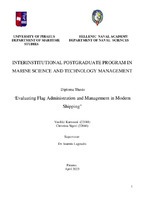| dc.description.abstractEN | The dissertation makes an in-depth analysis of the current flag administration and management practices in modern shipping, drawing a difference between traditional maritime nations and flags of convenience. It also applies the method of systematic review in analyzing the data that was sourced from various sources: academic journals, reports from the industry, and Clarkson Research. The findings that come out clearly show a wide discrepancy in the level of compliance and mechanisms for enforcement. Therefore, countries such as Norway and Greece are among the Worlds' leaders in complying with international maritime conventions, thanks to rigid regulatory contact and rigorous enforcement, complimented with the adoption of advanced technology. Normally, flags of convenience have low levels of compliance; it might be Panama, Liberia, and Marshall Islands, considering that, compared to any other incentive placed on safety and environmental standards, the cost reduction appears much more economically inviting. The paper discusses how flag state choices are economically driven and emphasizes the need for further cooperation among nations to address these inequalities. It is also noted that improving regulatory capacity can be achieved through technological integration by way of digital compliance systems and real-time monitoring tools. Suggestions include reforming the regulatory framework, using technology, and offering incentive programs with good-behavior rewards and bad-actor penalties. These measures become indispensable in ensuring greater compliance levels, better safety and environmental protection, and superior working conditions for seafarers—together contributing to more sustainable and fair global shipping operations. | el |



